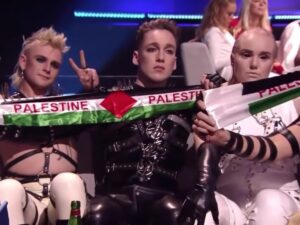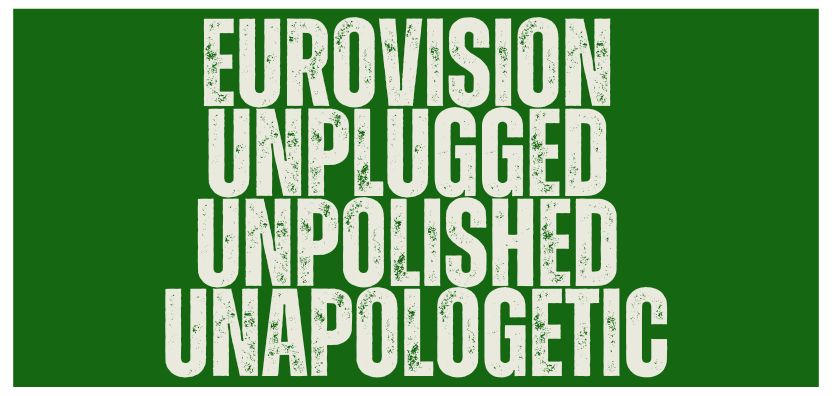As the Eurovision Song Contest approaches its annual spectacle of music, sequins, and outrageous performances, it’s worth taking a moment to remember some of the biggest scandals that have rocked the event in its rich and storied history. From political tensions to outlandish acts, these controversies have certainly made their mark on the Eurovision landscape.
La la la
The 1969 Eurovision Song Contest remains one of the most controversial and hotly debated editions in the competition’s history. The contest ended with an unprecedented four-way tie for first place between Spain, the United Kingdom, the Netherlands, and France. However, Spain’s victory stirred up the most controversy, with many speculating that the country’s dictator, General Francisco Franco, had a hand in rigging the 1968 competition in favour of Spanish singer Massiel and her entry, “La, La, La.”
Theories and allegations of vote-buying have prevailed ever since. In 2008, a Spanish documentary titled “1968. Yo viví el mayo español” (1968. I Lived the Spanish May) reignited the controversy surrounding Spain’s win. The documentary featured statements from Spanish television presenter José María Íñigo, who claimed that Franco had bribed foreign jurors to secure the victory for Spain.
According to the documentary, Franco was desperate to improve Spain’s international image and saw a Eurovision win as an opportunity to do just that. The dictator allegedly orchestrated a vote-buying scheme to ensure Massiel would come out on top, defeating the UK’s Cliff Richard and his entry, “Congratulations.” The scandal was particularly notable, as Richard’s song was a hot favourite to win the contest.
However, the truth behind the allegations remains murky. José María Íñigo later retracted his statements, claiming that he had been misunderstood and had no concrete evidence to support the vote-rigging claims. Massiel has vehemently denied any foul play and has defended her win.
The 1969 Eurovision Song Contest remains shrouded in suspicion and doubt despite the lack of concrete evidence. The scandal serves as a reminder of the competition’s potential for political manipulation and its long history of controversy.
Georgia’s Political Entry (2009)
In 2009, Georgia’s entry, “We Don’t Wanna Put In,” faced backlash and disqualification for its overt political overtones. The song, widely interpreted as a critique of then-Russian Prime Minister Vladimir Putin, came after the 2008 Russo-Georgian War. Eurovision officials deemed the lyrics too political for the competition, and Georgia was ultimately disqualified when they refused to change the song.
Belarus’s Jury Vote Scandal (2019)
During the 2019 Eurovision Song Contest, the Belarusian jury was dismissed after they violated the contest’s rules by revealing their votes during the first semi-final. As a result, the EBU created an aggregated Belarusian vote based on the votes of other countries with similar voting records. The situation cast doubt on the integrity of the voting process and led to calls for increased transparency.
Same-sex scandals
Ireland’s 2018 Eurovision entry, “Together” by Ryan O’Shaughnessy, featured a same-sex couple dancing in the background. While the performance was lauded for its positive representation of LGBTQ+ relationships, it faced backlash and censorship from some conservative countries, including a Chinese broadcaster’s refusal to air the performance. This led to the EBU terminating its contract with the network.
Lithuania’s 2015 Eurovision entry by Donny Monika Linkyte and Vaidas Baumila, generated controversy when two male dancers shared a same-sex kiss on stage. The performance prompted both support and backlash, with some accusing it of being a political statement, while others praised the act for promoting LGBTQ+ visibility.
The Greek-FYROM Naming Dispute (2008)
The long-standing naming dispute between Greece and the former Yugoslav Republic of Macedonia (FYROM) spilt into the 2008 Eurovision Song Contest. Greek broadcaster ERT refused to air FYROM’s entry, “Let Me Love You” by Tamara, Vrčak, and Adrian unless the country name was displayed as “FYR Macedonia” instead of “Macedonia.” The dispute highlighted the ongoing political tensions that can impact the contest.
Azerbaijan – no stranger to scandal
Since its debut in the Eurovision Song Contest in 2008, Azerbaijan has faced several controversies and accusations about participating in the competition. The country’s involvement in the contest has been fraught with scandal, from vote-rigging to human rights concerns.
In 2009, Azerbaijan faced accusations of spying on its citizens after discovering that people who had voted for Armenia’s Eurovision entry were identified and questioned by Azerbaijani authorities. Azerbaijan’s national security ministry allegedly spoke to each of the 43 Azerbaijani who voted for Armenian duo Inga and Anush, singing Jan Jan. Though officials told the BBC that they had “merely invited [voters] to explain” their votes, one fan described a more robust interrogation
“They said it was a matter of national security,” Rovshan Nasirli told Radio Free Europe. “They were trying to put psychological pressure on me, saying things like, ‘You have no sense of ethnic pride. How come you voted for Armenia?'”
The incident raised concerns about political interference in the voting process and the safety of Eurovision viewers in politically tense regions.
In 2013, Azerbaijan faced one of the most significant vote-rigging scandals in Eurovision history. An investigation by Swedish media revealed that Azerbaijan had allegedly attempted to buy votes for their entry, Farid Mammadov, who ultimately finished in second place. The scandal prompted the European Broadcasting Union (EBU) to tighten its voting regulations, but the controversy overshadowed the competition’s reputation.
When Azerbaijan hosted the Eurovision Song Contest in 2012, human rights organisations criticised the country’s record on human rights and freedom of expression. Activists highlighted issues such as forced evictions, political repression, and the imprisonment of journalists, urging the EBU to address these concerns. Armenia withdrew from the contest due to security concerns.
Netta’s Cultural Appropriation Accusations (2018)
Israel’s 2018 winning entry, “Toy” by Netta, faced accusations of cultural appropriation due to its incorporation of Japanese elements, including the singer’s kimono-style outfit and maneki-neko cat figurines on stage. Critics claimed that the performance appropriated Japanese culture for aesthetic purposes, while others defended it as an example of artistic expression and cultural exchange.
The Russian-Ukrainian Feud (2017)
An ongoing feud between Russia and Ukraine marred the 2017 Eurovision Song Contest. Due to her previous performance in Crimea, the Ukrainian government banned Russia’s entry, Yulia Samoylova, from entering the country. The contest organisers offered alternative solutions, including performing via satellite, but Russia ultimately withdrew from the competition, causing further tension between the two nations.
Romania’s Disqualification (2016)
Romania was disqualified from the 2016 Eurovision Song Contest due to the country’s outstanding debts to the European Broadcasting Union (EBU). This marked the first time a country had been barred from competing over financial issues, leaving their selected artist, Ovidiu Anton, unable to perform his song “Moment of Silence.”
Flags
The EBU faced backlash in 2016 when they released a list of flags banned from the Eurovision Song Contest, including those of non-participating countries and certain regional flags. Criticism intensified when the list also included the LGBTQ+ rainbow flag, albeit with the caveat that it should not be used to make political statements. The EBU eventually revised their policy to allow the rainbow flag and some regional flags, but the incident sparked a heated debate about the role of flags in the contest.
Armenian singer Iveta Mukuchyan raised tensions during the 2016 Eurovision Song Contest by waving the flag of the disputed Nagorno-Karabakh region in the green room. Given the ongoing conflict between Armenia and Azerbaijan, her actions were seen as provocative and politically charged, violating the contest’s non-political stance.
 In 2019, Iceland’s Hatari caused a stir when they unfurled banners featuring the Palestinian flag during the contest’s finale in Tel Aviv, Israel. The political statement violated Eurovision’s rules prohibiting political gestures, and the EBU fined the Icelandic broadcaster for the breach. The incident reignited debates about Eurovision’s political role, the balance between freedom of expression, and the contest’s non-political ethos.
In 2019, Iceland’s Hatari caused a stir when they unfurled banners featuring the Palestinian flag during the contest’s finale in Tel Aviv, Israel. The political statement violated Eurovision’s rules prohibiting political gestures, and the EBU fined the Icelandic broadcaster for the breach. The incident reignited debates about Eurovision’s political role, the balance between freedom of expression, and the contest’s non-political ethos.
Pop icon Madonna made waves with her performance during the same Eurovision Song Contest in Israel. The controversy arose when two of her dancers appeared on stage wearing Israeli and Palestinian flags on their backs, a move seen as a political statement amidst the ongoing Israeli-Palestinian conflict. Eurovision organisers quickly distanced themselves from the incident, stating that the display had not been approved beforehand.
The Italian Cocaine Allegations (2021)

Italy’s winning entry in the 2021 Eurovision Song Contest, “Zitti e Buoni” by Måneskin, faced a scandal when lead singer Damiano David was accused of using cocaine during the live broadcast.
French broadcaster Stéphane Bern said President Emmanuel Macron urged him to complain. As the votes were coming in during a tight race between Italy and France, claims of drug use were made on social media after David appeared to bend over a table backstage while on camera. Bern described the resulting scandal as a “big, big mess.”
David vehemently denied the allegations and a subsequent drug test confirmed his innocence. The incident underscored the intense scrutiny and pressure faced by Eurovision participants.



You are mixing 2 contests and making a big salad of it, so let put the records straight.
The 1968 was held in London, with Spain(La, La, La)finishing 1st ahead of U.K.(Cliff Richard). In that contest came later the allegation of Franco’s bribery. The documentary, linked in the article, talks about 1968 and not about 1969.
The 1969 contest was held in Madrid. Spain(Salome, Vivo Cantando)and U.K.(Lulu, Boom Bang a Bang) were among the winners. That 4 winners tie was almost the kiss of death for the contest as only 12 countries took part in the 1970 contest, but that another story.
I think that the same kiss scandal is attached to the 2015 Lithuanian song and not the 2012 as mentioned in your article. In 2012 the singer was alone on stage through the whole performance.